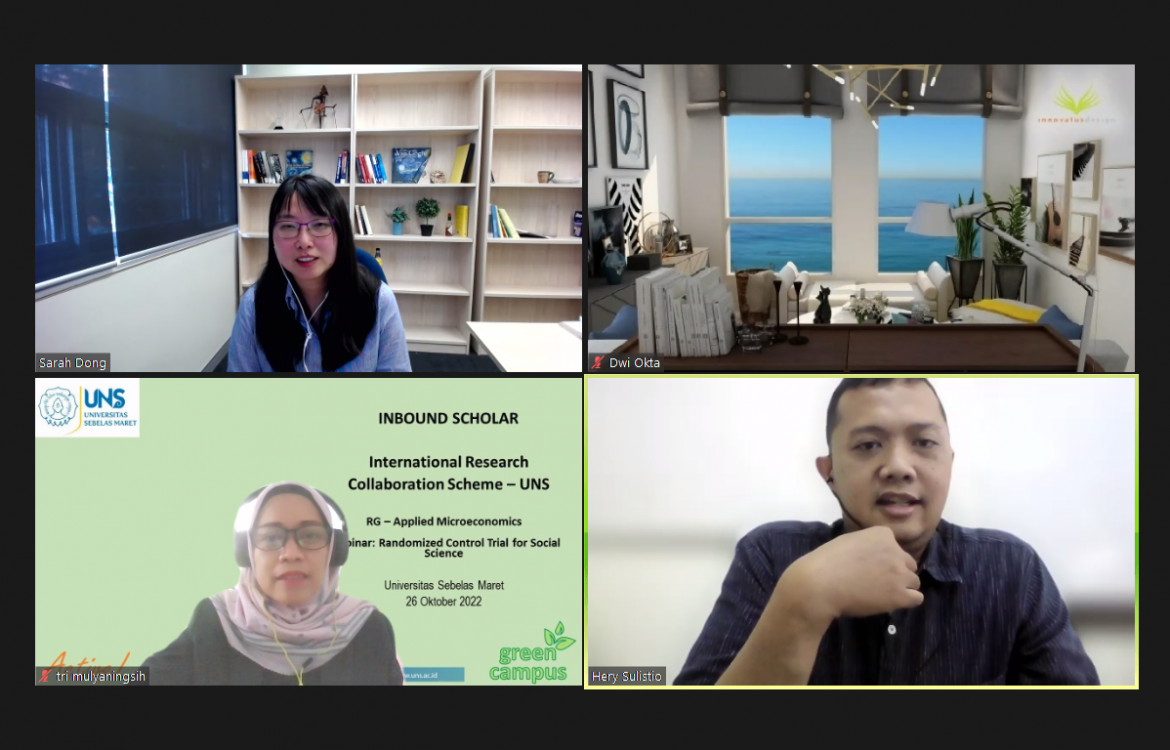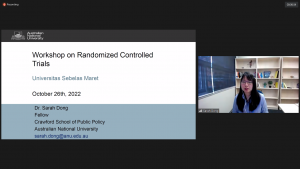
FEB UNS Applied Microeconomics Research Group Discuss Randomized Control Trial for Social Science in an Inbound Scholar Webinar
The Applied Microeconomics Research Group, Development Economics Study Program, Faculty of Economics and Business (FEB), Universitas Sebelas Maret (UNS) Surakarta, hosted an Inbound Scholar guest lecture entitled Webinar: Randomized Control Trial for Social Science, with Dr. Sarah Dong from Crawford School of Public Policy, Australian National University (ANU). The webinar, as part of the series in the UNS International Research Grant Scheme, was conducted virtually through the Zoom Cloud Meeting on Wednesday, October 26th, 2022.
 Starting the material presentation, Dr. Sarah explained the implementation of the RCT technique, especially in a public policy context. Regarding this matter, she provided an example of the contra-factual effect. For instance, a research attempting to measure the effect and efficiency of a social assistance program under two different assumptions, where the effect of assistance for a specific recipient will be compared to the condition of the same subject when they do not receive assistance. “Under this context, OLS regression is not applicable to determine the causality effect of assistance provision or a policy implementation,” explains Dr. Sarah.
Starting the material presentation, Dr. Sarah explained the implementation of the RCT technique, especially in a public policy context. Regarding this matter, she provided an example of the contra-factual effect. For instance, a research attempting to measure the effect and efficiency of a social assistance program under two different assumptions, where the effect of assistance for a specific recipient will be compared to the condition of the same subject when they do not receive assistance. “Under this context, OLS regression is not applicable to determine the causality effect of assistance provision or a policy implementation,” explains Dr. Sarah.
Further, Dr. Sarah explained the process of RCT implementation that tend to require more intensive planning. Generally, she divided the planning process into three stages. The first stage of RCT implementation is determining the design for the randomization process, this stage includes sample size determination, randomization technique, and randomization validation test. The second stage is intervention, which refers to the categorization of research subjects into control groups. The last stage is result examination using statistical analysis to calculate the effect of applied treatment. “Randomization process can be challenging, especially if the process was conducted by an independent agent where the process can deviate from research objectives,” she added.
After detailing the RCT application process, Dr. Sarah explains the example of research topics that can use the RCT technique and her previous research project using the RCT technique. Nearing the end of the agenda, Dr. Tri Mulyaningsih, as the Moderator of the discussion, delivered a brief summary of Dr. Sarah’s materials and started the interactive question-and-answer session. “Thank you for this opportunity, there are many questions from participants, you can contact me directly through the provided email address in case you have further inquiries on RCT technique,” concluded Dr. Sarah at the end of the webinar session.

